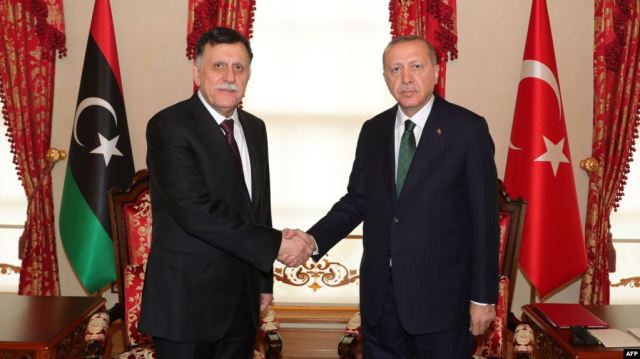
Erdogan met Libya’s Sarraj- Photo via AFP
As Turkish warships and loyal Syrian mercenaries have reportedly arrived in Libya, questions have been raised about the Turkish president’s real goals in his Libyan adventure. The formal Turkish line is that Erdogan is supporting the UN-backed Government of National Accord (GNA) in Tripoli, but the ambitious Turkish leader’s real intentions are much more sinister.
For Erdogan, Libya is the 2020 version of North Cyprus. The Turkish president is seeking to challenge Europe again by carving up a loyal entity facing European shores in an ambitious bid to expand his East Mediterranean gas exploration plans to expand within the heart of Africa.
If you visited North Cyprus and sat in its small eclectic Ercan Airport, observing that all the flights arriving and departing belong to Turkish Airlines, you will sense the inevitable fate of Western Libya under Turkish control___ an isolated entity stuck in a permanent state of no peace/no war, and no horizon for a comprehensive political solution.
The Turkish president is popular within certain groups in Western Libya, particularly Islamists and Libyans of Turkish descent, more so than he is in North Cyprus, where most of the natives are moderate, non-ideologically oriented Muslims. Furthermore, there is a growing, misplaced nostalgia towards the bygone era of Ottoman-controlled Libya, fuelled mostly by decades of oppressive pan-Arab nationalism that has ruined Libya. In fact, Islamist groups loyal to the Turkish president aggressively encourage such nostalgia in a bid to win hearts and minds among the heavily populated tribal and civilian groups in Western Libya.
Against that backdrop, the Turkish government rushed to sign tentative military and maritime agreements with the UN-backed Government of National Accord (GNA) led by Prime Minister Fayez al-Serraj. This was later followed by sending thousands of armed militants from Syria, together with advanced heavy weapons to boost the defence of GNA forces and to stop the advance of the GNA’s opponent, the Libyan National Army (LNA), which was marching from Eastern Libya under the command of General Haftar.
Erdogan’s strategy in Libya is threefold: First, he wants to achieve a military balance between Saraj’s GNA forces and Haftar’s LNA to stop the latter’s advance towards Tripoli. Second, Erdogan is determined to block any political agreement that aims to disarm his loyal militias in Western Libya or return them back to Syria. Third, he wants to create a de-facto partition in Libya and a separate entity in Western Libya that is fully dependent on Turkey for its survival.
The current weak and divided global order will ultimately help the Turkish president achieve his goal. The UN Secretary General, Antonio Guterres, openly admitted the situation in Libya is a “scandal,” and he criticized the countries that met in Berlin last month to push for progress in the Libyan peace talks. “They committed not to interfere in the Libyan process and they committed not to send weapons or participate in any way in the fighting,” Guterres said, and added, “The truth is that the Security Council (arms) embargo remains violated.”
Judging by the unfolding tragedies in Syria and Yemen, the UN may succeed in forging a ceasefire in Libya (which may or may not last), but it will not achieve a lasting political deal between the two rival sides.
Moreover, the Turkish president understands that even if direct negotiations resume between the two rival Libyan leaders, Serraj and Haftar, and they miraculously reach a political settlement, their agreement will not survive in reality, simply because no rational country will commit to sending UN peacekeeping forces that have a mandate to disarm hard-core Islamist militants embedded in Libya. Those militants are not willing to abandon their lucrative payments and return to the Syrian inferno.
Unlike Syria, however, those countries that back General Haftar and the LNA, whether they be Egypt, the UAE, or even Russia, cannot afford the political cost of advancing into heavily civilian areas in Tripoli and Misrata. Therefore, any permanent ceasefire devoid of an agreed political settlement will lead to the inevitable de-facto partition of Libya.
Northern Cyprus serves as a vivid example of Turkey’s ability to bring political and military paralysis to a country in the heart of Europe, leaving behind a permanent legacy of no war/no peace. The likelihood of repeating this scenario in Libya does not necessarily depend on the ability of Erdogan’s Libyan allies to achieve field victories, but on the failure of international and Arab parties to prevent the existence and long-term survival of the unfolding pro-Turkish entity in Western Libya.
The Turkish president’s foreign policies may be erratic, emotional, and overly ambitious, but unlike other fronts, he stands a good chance of succeeding in Libya, despite all the odds.
An Arabic version of this piece was published in Al-Hurra

